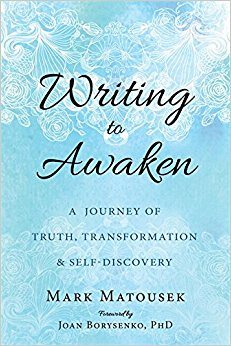Writing to Awaken
Mark Matousek’s new book is a journey to deeper self-knowledge.
By Schuyler BrownThe Universe has a wicked sense of humor. That was my first thought when asked to review Mark Matousek’s new book, Writing to Awaken. I’d been avoiding my own writing demons for months and trying various tactics to get the juices flowing again. I enlisted a writing partner, committed to journaling daily, and set a deadline for the completion of two unfinished manuscripts that sit collecting digital dust in cyberspace purgatory. In spite of these efforts—or because of them—I wasn’t finding joy in writing anymore. My writing certainly wasn’t awakening me—if anything, it was torturing me.
I’d never read a book about writing. Part of me feared that reading about writing might interrupt my own natural creative process. So opening the pages of Matousek’s book was difficult for me, but almost immediately gratifying. I found in the opening pages an invitation to a journey and his was convinced by his belief in the power of writing to transform anyone. I realized with some embarrassment that I’d assumed this was a book for “serious writers.” Instead, Writing to Awaken is a very engaging journey to deeper self-knowledge, which is open to anyone who wants to live a more truthful and awakened existence. Writing is merely the medium.
Part One, entitled “Who Am I,” is an intelligent departure point for the journey ahead, and a good primer on self-inquiry and shedding masks. Here Matousek asks the reader/writer to tackle stories formed in childhood, secrets, shame, shadow, fear, and desire. He asks us to mine the darker corners of our lives for gems and to shed layers of ourselves to reveal the clear voice and perspective of our wise inner child and higher self.
 In Part Two, “Exploring the Story,” Matousek asks us to dive deeper into our stories. He reveals a challenge in the process of self-discovery: four primary demons. At this point I was ready to confront what might be ailing me and I read ahead eagerly. Matousek counsels, “If we don’t face these demons, we are unable to explore our story objectively or write truthfully about what we find.” I knew this to be true for myself and was comforted by his presentation of the demons as universals. (I invite you to read the book to find out what the four demons are.) I found this section to be full of insights into human nature, well beyond writing. It’s clear that Matousek has been on this journey himself. He has distilled his wisdom into easily digestible chapters that keep us moving ever inward. As he says, “the ability to imbue our life with beauty and meaning is an inside job.”
In Part Two, “Exploring the Story,” Matousek asks us to dive deeper into our stories. He reveals a challenge in the process of self-discovery: four primary demons. At this point I was ready to confront what might be ailing me and I read ahead eagerly. Matousek counsels, “If we don’t face these demons, we are unable to explore our story objectively or write truthfully about what we find.” I knew this to be true for myself and was comforted by his presentation of the demons as universals. (I invite you to read the book to find out what the four demons are.) I found this section to be full of insights into human nature, well beyond writing. It’s clear that Matousek has been on this journey himself. He has distilled his wisdom into easily digestible chapters that keep us moving ever inward. As he says, “the ability to imbue our life with beauty and meaning is an inside job.”
I was surprised to find Part Three entitled, “Dropping the Mask.” I felt at this point, if I’d been doing all of the exercises in the book in order, I’d have already dropped many masks. But in Part Three we’re asked to explore our social persona, ideas around performance, learning from loss, and the power of setting intentions. I felt the journey beginning to ripple out into ever-widening circles.
And finally, Part Four, “Awakening,” is the destination and the pay-off for all the deep work the reader/writer has done. One could spend a lifetime in this section, reading and re-reading the prompts and reminders to embrace wonder, to play, to learn to begin again at any time. He tells the story of Fern, a regular student of his for years, a woman in her eighties who has taken the same online class year after year and writes a new response to the same questions over and over. When he asks her why she doesn’t try a new class she writes, “Even though I’m using the same questions, I hear them differently every year… this is a mirror for how much I’m actually changing. I do this because it helps me keep a record of my inner journey. My journey which belongs to me and no one else.” Reading about Fern and other of Matousek’s students was humbling and reaffirming of my own love of writing. It’s not about external outcomes, but the inner journey through one’s own unique landscape.
Matousek frequently reminds the reader why this work is important. “The realization that you are not your story enables you to reinvent that story,” he writes. “Using mindfulness, aspiration, passion, and moral compass, you can revise the roles you play with verve and imagination. This provides you with enormous freedom—a great roar of freedom that’s more resounding than you believed possible.”
Writing to Awaken is a workbook and I felt in reading it that I wanted to be doing the exercises with someone—with Matousek, of course. His examples of student work and the exchanges he’s had with them to deepen their writing demonstrated his mastery as a teacher of writing. But, short of that, I wanted a writing partner or partners. This would be a beautiful book to dig into with a group of friends.
At times, I felt that the book was playing down the intensity of these self-inquiry practices. For example, “shadow work” is nothing to be trifled with and trauma is a real thing for all of us. Trauma can create sub personalities and patterns of protection so deep and mesmerizing they can be hard to cut through alone, even for a dedicated practitioner. One needs community, feedback, and another person who can be a compassionate mirror. I wondered what Matousek would advise his reader on some of the harder lessons of “shadow work.” It was clear he is a skillful guide in the teaching format, but what is the random reader to do when he or she runs up against a demon too strong to be dealt with alone? I’m curious.
Writing to Awaken left me feeling differently about writing. Will I finish the books I’ve abandoned? Before I would have said, “I will if it kills me.” Now I’ll say, “I will if it awakens me.”
Schuyler Brown is a writer living in Brooklyn, New York.
Mark Matousek is co-leading a workshop at the Garrison Institute with Maria Sirois, “Writing For Resilience: The Life Saving Power of Changing Your Story,” on April 12-14, 2019. Click here to learn more and register.
